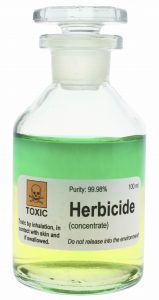By Lauren Sandford

Glyphosate is the active ingredient in Monsanto’s signature weed killer, Roundup. Discovered to be an herbicide by organic chemist John E. Franz in 1970, glyphosate has the ability to effectively kill unwanted weeds and overgrowth from root to tip. Though Roundup, a chemical cocktail which uses glyphosate as its main ingredient, and other glyphosate-based weed killers are designed to be toxic to plants, thousands of consumers have come forward alleging that Roundup is toxic to humans, as well. Roundup’s manufacturer, Monsanto, which was purchased by Bayer AG in 2018, currently faces more than 18,000 consumer lawsuits claiming years of exposure to Roundup has given them cancer.
The herbicide does not only have the potential to affect human health; dangerous levels of glyphosate residue can harm the livestock that graze chemically-treated pastures and ecosystems that border farmland. Consumers who ingest grains, corn or cereal products that were sprayed with glyphosate when being grown, or visit parks where Roundup is actively sprayed, can be easily harmed as well. These dangerous impacts to the environment, wildlife and human health come as a result of aggressive use of pesticides and herbicides.
Glyphosate and farming
When growing crops such as wheat, corn, oats and soy, it is often necessary for farmers to spray herbicides in order to protect and maintain their crops. In 1996, Monsanto commercialized Roundup Ready seeds that are resistant to glyphosate. The introduction of these seeds allowed farmers to spray Roundup across entire fields without worrying about the herbicide killing their crops. Widespread agricultural spraying can make it easier to control weed growth, but it also creates an unnecessary health risk to field workers who handle the herbicide, and livestock that ingest chemically-treated feed. Livestock raised on the same farms that grow grains are also in danger of inhaling airborne glyphosate, which can drift for miles in any direction from where Roundup Ready crops are sprayed.
A Danish study of eight dairy farms found that consumption of animal feed contaminated with glyphosate was potentially toxic to their health. Based on the study’s discovered correlations between excreted glyphosate in the cows’ urine and the measured blood sample parameters, researchers concluded that “glyphosate is toxic to the normal metabolism of dairy cows,” which can be indicative of liver and kidney damage. The same researchers also studied glyphosate’s toxicity to piglets and found traces of glyphosate present in the organs, including the heart, lungs, and kidneys, of the piglets who also suffered from birth defects.
Another investigation into the effect of glyphosate on cattle was administered by Dr. Ted Dupmeier, a veterinarian from Saskatchewan, Canada. Dupmeier studied a herd of 250 cattle that regularly consumed Roundup Ready corn and found that the animals experienced a variety of adverse side effects, such as stillborn births, weak calves, skeletal problems, and navel infections.
Glyphosate and surrounding environments
The chemicals in Roundup have also been seen to negatively impact ecosystems that surround farmland where the herbicide is sprayed. Water runoff from farms, for example, can permeate nearby streams, rivers, and lakes, and can contaminate tap water and other water supplies, such as reservoirs. Toxic runoff from farmland that flows into neighboring water systems has also been seen to disrupt aquatic ecosystems and impact the wild animals and plant life that require these habitats for survival.
Glyphosate detected in food
Consumers are growing increasingly troubled as many popular oat-based snack products are now testing positive for traces of glyphosate. According to tests conducted by the Environmental Working Group (EWG), 21 products manufactured by General Mills, including different flavors of Cheerios cereal and Nature Valley granola bars, were found to contain glyphosate residue. The EWG discovered that Honey Nut Cheerios Medley Crunch and original Cheerios held the highest levels of glyphosate, at 833 parts per billion and 729 parts per billion, respectively. The group deems anything over 160 parts per billion to be “unsafe for children” to consume.
Glyphosate and human health concerns
The thousands of consumers who have filed lawsuits against manufacturers Monsanto and Bayer AG claim that years of consistent Roundup use has caused them to develop various forms of blood cancers, including non-Hodgkin’s lymphoma and leukemia. So far, the agrochemical company has lost three prominent jury trials in Roundup litigation, with at least six more cases scheduled in the near future. The Monsanto Roundup trials that have taken place so far are listed below.
- Dewayne “Lee” Johnson, verdict announced August 2018: After years of using Roundup to maintain the school grounds where he worked, Johnson was awarded $282 million by a San Francisco jury. Johnson claimed that his terminal non-Hodgkin’s lymphoma diagnosis was brought on by recurring Roundup exposure. Johnson’s initial award was later reduced to $78 million, which was appealed by Monsanto in April 2019.
- Edwin Hardeman, verdict announced March 2019: A U.S. jury awarded $80 million in damages to Edwin Hardeman, who blamed years of exposure to Roundup led him to develop non-Hodgkin’s lymphoma. Johnson’s initial award was recently decreased to the sum of $25.27 million.
- Alva and Alberta Pilliod, verdict announced May 2019: The California couple used Roundup to maintain personal and rented properties since the 1970s, and were both diagnosed with different forms of non-Hodgkin’s lymphoma as a result. Alva and Alberta were awarded $2 billion after claiming that years of Roundup exposure caused their cancers. However, this payout was newly reduced to just $86 million after a superior court judge found the jury’s punitive damages award to be “excessive and unconstitutional.”
- Walter Winston, trial beginning October 2019: The next Roundup trial is set for October 15, 2019 in Monsanto’s hometown of St. Louis, Missouri. Winston and several other plaintiffs are suing Monsanto, saying their use of Roundup caused them to develop non-Hodgkin’s lymphoma.




